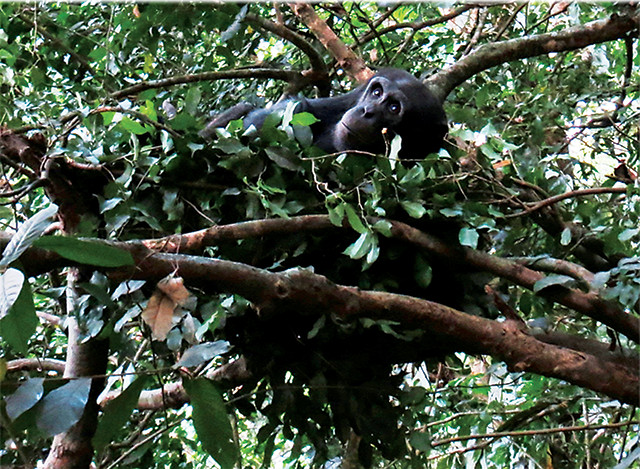
by Mary Caperton Morton Tuesday, April 19, 2016

Chimpanzees sleep an average of 11.5 hours per day, usually in a tree nest, whereas humans snooze for just seven hours. Credit: Kathelijne Koops, University of Zurich, Switzerland.
We humans spend about a third of our lives asleep. While that might sound like a lot, we require less sleep than most mammals. In a new study, researchers have quantified how much less sleep we need than other primates, and the findings may offer clues to how and when human sleep patterns evolved.
Studying sleep in cooperative human subjects can be tricky, but studying sleep in primates is even more challenging. Subjects cannot be restrained or drugged, as that might interfere with their ability to fall into normal sleep patterns. And “you can’t just glue electrodes to chimps. With their grooming instincts, they will rip them right off,” says David Samson, an evolutionary anthropologist at Duke University and a co-author of the new study published in Evolutionary Anthropology.
Instead, researchers study sleep in primates by looking for behavioral signatures of REM and non-REM sleep. “We all know REM sleep by rapid eye movement, but we can’t always see the eyelids of a sleeping primate,” Samson says. However, movement of the diaphragm — the abdominal muscle that expands and contracts during breathing — is linked to rapid eye movement during REM sleep, he says, “and we can readily track diaphragm movement, no matter what position they fall asleep in.”
To study how modern human sleep patterns compare to primates, Samson and his co-author Charles Nunn, an anthropologist at the Duke Global Health Institute, compiled a database of sleep behavior studies for 21 species of primates.
They found that the majority of primates needed far more sleep each day than humans, with some species like the southern pig-tailed macaque and gray mouse lemurs needing 14 to 17 hours of sleep a day. In contrast, modern humans sleep between six and eight hours a day. A separate study of traditional hunter-gatherer societies in Tanzania, Namibia and Bolivia has shown that people without modern conveniences or clocks sleep even less, between five and seven hours a night.
Samson and Nunn also found that humans seem to sleep more efficiently than other primates, spending more time in deeper stages of sleep, including REM sleep, which makes up nearly 25 percent of our overall sleep time on average. Primates such as mouse lemurs, mongoose lemurs and African green monkeys spend less than 5 percent of their sleep time in REM sleep.
Our ability to sleep intensely for shorter periods of time may have evolved early, around the time early humans started sleeping in groups on the ground near controlled fires, Samson says — perhaps as early as 1.5 million years ago. “We propose a novel idea called the sleep intensity hypothesis: Early humans experienced selective pressure to fulfill sleep needs in the shortest time possible.”
Such pressures could have included increased risks of predation and intergroup conflicts, as well as benefits realized from being awake longer, like acquiring new skills and honing social interactions. Deep sleep is also thought to be critical for learning and may have played a role in our rapidly evolving cognitive abilities, they wrote. Fire would have greatly increased safety from predators, allowing people to sleep more deeply.
The study offers a good starting point for further work on the newly proposed sleep intensity hypothesis, says Gandhi Yetish, an anthropologist at the University of New Mexico who was not involved in the new study. “This idea falls in line with much of what I’ve seen in studying the evolution of sleep. Consolidation of sleep into a shorter time period was a significant step in our cognitive evolution.”
The next step will be to test some of the predictions of this model by looking at interactions between sleep patterns and different ecological variables, Yetish says. “The use of fire stands out most obviously as unique to humans and early hominids,” he says. “Perhaps fire was the turning point for us: Controlled use of fire allowed people to sleep in this more consolidated way, which led to rapid behavioral and cognitive development.”
© 2008-2021. All rights reserved. Any copying, redistribution or retransmission of any of the contents of this service without the expressed written permission of the American Geosciences Institute is expressly prohibited. Click here for all copyright requests.